- Home
- Kristi Belcamino
Blessed Are Those Who Weep Page 3
Blessed Are Those Who Weep Read online
Page 3
The sexy cops calendar didn’t help any, either. Someone hung it up in the newsroom, and there is endless teasing about it. And it’s not only jealous women who give me a hard time. The men are just as bad. For instance, Jon, the investigative reporter, will make a big scene, saying, “Gee, I wonder what day it is today? Let me go consult with Giovanni’s hunky boy toy and find out.”
Finally Kellogg made them all back off. But I’m sure they still talk about me behind my back.
Today it doesn’t help that all the TVs in the newsroom are showing recaps of the massacre footage, including me driving away in the squad car with the baby. A brief glance reminds me I look like a crazy, homeless lady. Not my finest TV moment. Not in line with la bella figura. At all.
KXYZ is on the big screen, and even from across the newsroom I can read the words under the footage of me holding the baby—“Gabriella Giovanni, reporter with the Bay Herald.”
It explains the stack of missed message slips waiting for me on my desk. The news clerk adds two more to the pile as I slide into my chair.
“Thank God you’re here,” she says. “People have lost their fucking minds this morning calling for you.” She rolls her eyes and stalks off as only a five-foot-tall, eighty-pound woman can.
“Not my fault,” I say to her back. Flipping through the stack of messages, I roll my eyes, too.
One message is blunt: What’s your alibi? Pretty convenient you were the one to find them.
Another is kinder: . . . is a psychic. Wants to meet with you to tell you who the Mission Massacre killer is.
Sometime since last night, the hive mentality dubbed the slayings “the Mission Massacre”—probably based on the Tribune’s headline.
After the third message—Baby is possessed and killed family telepathically—I stop reading.
But my phone doesn’t stop ringing. Unfortunately, the publisher insists we answer calls to our desk, even if they are wack jobs. He says you never know. Every once in a while, he’s right, too.
In between answering calls, I wade through the voice mails waiting for me and nibble on a packet of cracker-and-cheese sandwiches from the vending machine. One call is from a radio announcer. He actually sounds pretty nice. And normal.
“Dave Schrader here. Darkness Radio. I heard about your . . . experience . . . with the Mission Massacre. I was wondering, with all that you’ve seen and done in your job, if you’d be my guest on True Crime Tuesdays. If so, can you please give me a call?”
Chris Lopez, my good friend and favorite photographer at our newspaper, is always trying to get me to listen to Darkness Radio, says I’d dig it. I hit save and go to the next message. I delete most without listening to them in their entirety, but one makes me pause. I listen to it twice, taking notes the second time.
The woman doesn’t leave her name, but she has a lot to say:
“Isn’t that poor woman’s husband military? Good luck with him getting any support on dealing with that tragedy. The military is trying to hide it, but my sister’s husband is stationed in Kentucky, and there’s at least one soldier she knows who killed himself after he found out his wife had been in a car accident. She was in a coma and died before he even got leave to come back home to see her and say good-bye. And I know at least one other soldier who killed himself and his wife in front of their two kids only a week after he got back from Iraq. They are seeing some horrific things over there, and our military is doing nothing to help.”
I start jotting down notes on what she is saying, sensing a story in here somewhere. It has been nearly a year since the invasion of Iraq and somehow none of this has been reported yet. Or if it has been, it’s only been on a small-scale level.
“And there’s more,” she continues. “Not just suicides. There have been at least three soldiers who come home from Iraq and beat the living daylights out of their wives. They are seeing things over there that we don’t know about and that they can’t handle once they get back here. The worst part is the military isn’t doing anything about it. My sister said that her husband suffers from depression and he’s afraid to go to the doctor on base because he’s worried they will pooh-pooh his disease and might not even cover the cost of his meds.”
I wish this woman had left her phone number. It sounds like a good story. I’m sure Maria Martin’s husband will need a lot of support after what happened to his family, and if this woman is right, it doesn’t sound like the military will be the one to give it to him. I wonder if he’ll talk to me about it. Not now, but maybe later, after some time has passed?
What an injustice. They risk their lives and get worse than nothing in return? As I’m getting angry about it, my phone rings again.
The next caller points out that it is “disgusting” that I was holding a baby while my face was covered in blood. I take a peek at the photo in the Tribune. There is no blood. The caller is either blind or crazy.
“Thank you for calling,” I say and hang up without bothering to argue. The phone immediately rings again as I’m tossing most of the disgusting cheese-and-cracker things into the trash.
I snatch up the phone and say in an irritated voice, “Newsroom.”
“Gabriella Giovanni?” The woman has a thick accent.
“This is she.” I’m tapping my pencil on the desk, waiting for another crazy stream of nonsense.
“I am Maria Martin’s mother.”
My pencil freezes. Didn’t the Trib say all of the baby’s relatives had died in the massacre except her father? Is this a crank call?
“Yes. What can I help you with?” I scramble to find a notebook in the mess of papers on my desk.
“I want my Lucy. They say that she has to go to her father. That pendejo.” She sort of sputters out the last word.
The black-eyed baby’s name is Lucy. And I don’t know much Spanish, but I do know this woman didn’t call the father a prince.
“Ma’am, what is your name?”
“Teresa Castillo.”
I scribble it down.
“Mrs. Castillo, have you talked to the San Francisco Police Department?” She could still be a kook, but if she called the police, she’s probably legitimate.
“Yes. Detective Khoury says the father gets Lucy. Nothing I can do about it. They will not give her to me.”
She knows Khoury. It is the girl’s grandmother.
“Why are you calling me?”
“TV. I saw the look on your face. You care about her, not just getting a story in the paper.”
She’s right.
“Miss Giovanni, you have to believe me when I say this: That man, that devil, cannot get my granddaughter. I will die before I let that happen.”
The way she says it makes me believe her. I don’t understand.
“What do you mean? He’s her father.”
“Come see me in person. I will tell you.”
Just like her daughter. She wants to talk in person. She rattles off her address. She lives in San Juan Bautista, at least a two-hour drive. I scribble the address down obediently, but she hangs up before I can tell her I probably can’t drive that far to talk to her in person.
I can’t help but worry about what she has said. She’d rather die than let the father have the baby? I wonder if this is some weird “no man is good enough for my daughter” deal. But she called him “the devil.” There was something in her voice that indicated she doesn’t use that word lightly.
The grandmother’s desperation is so real that for a few brief seconds, I consider making a road trip to San Juan Bautista, until Kellogg swaggers over to my desk, butting his big belly up against my cubicle by accident. For a minute, the books I have balanced on a shelf wobble precariously.
“You okay?” he asks. Without waiting for an answer, he tells me that Nicole, my best friend and the courts reporter for the paper, will cover
the massacre.
I nod.
“You’re too close to this one,” he says in a voice that leaves no room for argument. “There’s a way you can make up for today’s snafu. Arnold says if you write a first-person account of what you saw inside that apartment, we’ll save face a little.”
What you saw inside that apartment. I swallow and nod.
“Can you handle that?” Kellogg’s brows knit in concern. “I could tell him no, but he’s so pissed off at you right now, I think you should do whatever he wants to appease him.”
Kellogg clears his throat and continues. “You didn’t hear this from me, but there’s been some talk of layoffs. The classified ads from Silicon Valley are shrinking, and the big guys at Knight Ridder are starting to panic.”
That sounds like blackmail. “If I write what the publisher wants, I can keep my job?” My words drip fury. How dare the publisher tell a reporter what to write?
“It’s not like that,” Kellogg says, not meeting my eyes and picking at a piece of loose plastic on my cubicle wall. “You know I’d quit before I let that happen. This is just an account of what you saw. Taking advantage of being there first. No sweat. I think you need to do this for several reasons: probably good therapy for you to get it out of your head, it is something only our paper will have that might help make up for the Trib’s scoop, and it wouldn’t hurt to have Arnold on your good side.”
“What if it hurts the investigation if I put those details in the paper?”
Kellogg straightens up, tilts his head, and looks at me sideways.
“What?” I narrow my eyes at him, wary of what he’ll say next.
“You know I’ve never said squat about you dating a cop. You’ve done a good job staying professional and not letting it affect your newspaper instincts. But right now you need to remember what side you’re on. You’re a goddamn good reporter, but you’re walking a thin line here. I know you’ve had a lot of personal shit go on the past two years, and I’ve given you a ton of slack. Because you’re damn good. Someone else—well, I would’ve let them go a long time ago. What you just said, about hurting the investigation? Don’t forget what your job is here, or there’ll be some big problems.
“You’re not a cop. You’re a reporter. Don’t forget it. Now, write the story. If you don’t want to do it for the publisher, do it for me.”
He lumbers back to his desk and squeezes into his cubicle, causing a minor earthquake around him. He could have taken over the big corner office when he was promoted to executive editor, but he wants to stay in the trenches with his reporters. He’s the smartest and best editor I’ve ever had, and I’d do anything for him, so his words sting. I’m not only shocked by his accusation; I’m also ashamed that I’ve given him reason to doubt my loyalty.
At that moment, the big-screen TV on the opposite wall shows the apartment building where the slayings occurred and once again cuts to a shot of me in the back of the police car with that same dazed look in my eyes. Aren’t people sick of seeing that footage?
I stare at the screen, seeing the baby girl’s head nuzzled in my neck. It’s a big story. A huge, giant, behemoth story. Kellogg is right. Of course I should write a first-person account about it. It’s something no other newspaper or TV station could possibly have.
At the same time, I can’t jeopardize any case the cops might have. Whoever deprived that baby girl of her family needs to be behind bars. And I’m not going to do anything to prevent that from happening. I’ll write the story. For Kellogg. Not the publisher. But I’m not putting anything in my story that may hurt the case.
As I open a new document on my computer, determined not to hurt the investigation with my story, a nagging voice in the back of my mind remembers how my first instinct at that apartment was to help the baby, not compose a story about what I was seeing. Deep down inside, I wonder if Kellogg is right. Have I forgotten whose side I’m on?
Chapter 7
I’VE CROSSED A line. Broken the rules of Journalism 101—never show a source a story before it runs—because after I finish my first-person account of what I saw in that apartment, I e-mail it to Detective Khoury with a note: My editors are on me to write about this. Will this hurt your case?
And I don’t even particularly like Khoury, either.
The story is about six inches long. Incredibly short by newspaper standards. More a “brief” than a story. But it’s all I’m willing to give.
In my story, I talk about having an appointment with Mrs. Martin. I leave out that she called me and wanted to tell me “the story of a lifetime.”
I describe walking up to find the door of the apartment slightly ajar, then give a brief account of what I saw when I nudged it open:
“Bodies lay strewn across the apartment, pooled in blood. A baby girl sat in the middle of them all, untouched.”
These two sentences are the lead of my story, going into the article through the back door, so to speak. Later, I go into how I scooped up the girl, changed her diaper, and gave her a bottle. Putting it on paper makes me realize how stunned I was. Why did I do all that before calling 911? I was acting on pure instinct. Although I was taking notes in the back of my mind, my urge to care for that child overcame anything else I knew I should do.
Drumming my fingers on my desk, I wait for an e-mail back from Detective Khoury. Every once in a while I cast a guilty glance over at Kellogg, as if he can read my mind and knows I showed a source a story.
Khoury’s response comes in less than three minutes. I click it open in a hurry.
“I’d prefer you didn’t write anything,” the e-mail says. “But what you have seems to be fine. Won’t hurt the case.”
I file the story in the editor’s queue and check my other e-mails.
But I can’t quash the guilt in the pit of my stomach for running the story by the detective. I know it was the right thing to do ethically as a person, but not the right thing to do as a journalist. And that’s the crux—they should technically be the exact same thing, right?
We never, ever read or show stories to sources before they run. But I needed to. The last thing I wanted to do was harm a case that would put a mass murderer behind bars.
When my phone rings, I snatch it up, thinking it’s Khoury changing her mind about my article, but it’s Nicole.
“Hey, how’s it going?” Her words are soft, guarded.
“I’m okay.”
“That was . . . awful . . . you know . . . that you had to see all that . . .” She starts and stops, clearing her throat. “Kellogg has me covering it. Did he tell you?”
“Yes.” Handing off the biggest story our newspaper has probably ever seen to another reporter—even my best friend—stings.
“Any arrest?” I ask, even though I just exchanged e-mails with Khoury.
“No. Off the record, my D.A. source told me the investigators are stumped. Nobody saw a thing.”
“Yeah. I’m their only witness, and I didn’t see anything.” I let out a strangled laugh.
Nicole is quiet for a minute. “I’m sorry this got punted to me. It feels weird.”
It is odd to have Nicole covering the story. It’s my story. It’s my beat. The Mission Massacre is one of the biggest stories to hit the Bay Area in my lifetime, and I’m benched, sitting on the sidelines. Like a chump.
I wait a second to answer. “No, it’s better you than anyone else. I know you’ll knock it out of the park.”
“Kellogg says he’s running your first-person account as a sidebar.”
There’s another long pause. “I’ll send you over my story. Tell me what you think,” she says.
“Thanks,” I say. And mean it. It’s not her fault.
Her voice brightens. “When are you and Donovan coming over for dinner? Ted has a new grill and wants to feed you two.”
“Sounds good
,” I say. “I’ll find out when Donovan has his next Saturday off.”
I say the words, but the truth is I’m not asking Donovan anything. Although I love Nicole like a sister, I’ve been avoiding invitations to her house for months. I’m not sure I can handle seeing her baby boy cooing in his bouncy chair. I’ve only met him once—I went to the hospital when he was born. But that was before.
That’s the thing I don’t understand. It’s been excruciating lately to be around babies, yet all that disappeared when I held Lucy. All I want to do is hold her again.
“Maybe you and I can meet after work this week for a drink?” I say.
“Let me check with Ted.” Now she sounds apologetic. “It’s been a little bit of a challenge to get to day-care pickup before they start charging us an arm and a leg for being late. I’ll figure out a night Ted can take off from work early so I can meet up with you.”
Again, the line is silent. Both of us contemplating just how much our worlds have changed in the past year. She has to check with her husband before she meets me for a drink?
I want my old friend back.
But it is more than that. I want my old life back. I want it like it was last year before every day was filled with longing and heartache.
Chapter 8
WHEN I WALK in, Donovan is sitting on my couch, scratching Dusty behind the ears and nursing a beer. The kitchen is dark. It’s Friday night, and we’re both home early. A year ago, he would’ve had something yummy to eat on the table. We’re like an old married couple now. We no longer try to impress each other. It makes me sad and wistful.
All that disappears as he stands and wraps me in his arms.
“You okay?” he whispers in my ear. His warm breath sends a shudder of desire through me. Dusty wraps himself around my legs, trying to be part of our embrace.
I push back an image of that apartment filled with bodies. It is instantly replaced with the memory of holding Lucy in my arms. I can almost feel her tiny fingers wrapped around my hair. I can’t stop thinking about how she reached for me when CPS took her away.

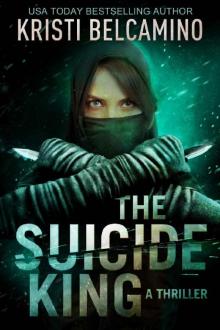 The Suicide King
The Suicide King Blood & Roses (Vigilante Crime Series)
Blood & Roses (Vigilante Crime Series)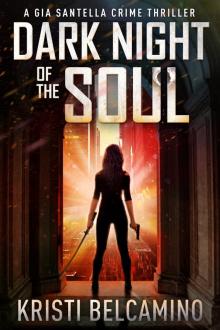 Dark Night of the Soul
Dark Night of the Soul Forgotten Island
Forgotten Island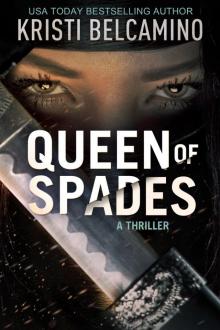 Queen of Spades
Queen of Spades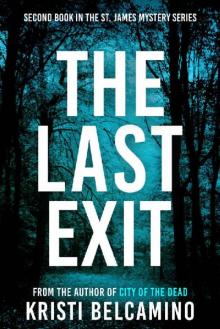 The Last Exit: A St. James Mystery (St. James Mysteries Book 2)
The Last Exit: A St. James Mystery (St. James Mysteries Book 2)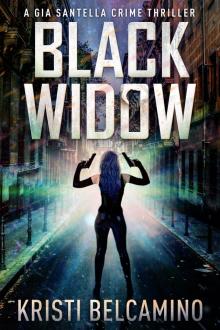 Black Widow
Black Widow Blood & Fire (Vigilante Crime Series Book 2)
Blood & Fire (Vigilante Crime Series Book 2) End Game
End Game Buried Secrets
Buried Secrets Death on Sunset Hill (A Tommy St. James Mystery Novella Book 2)
Death on Sunset Hill (A Tommy St. James Mystery Novella Book 2)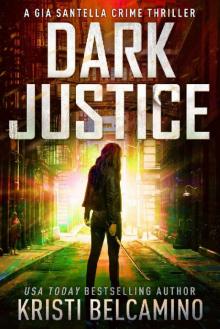 Dark Justice
Dark Justice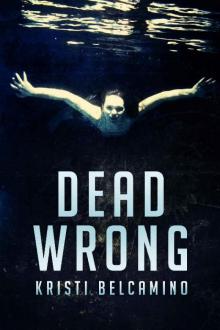 Dead Wrong
Dead Wrong No Way Out
No Way Out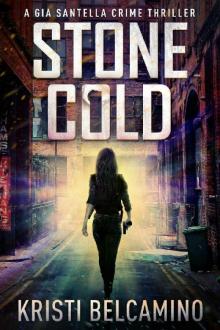 Stone Cold
Stone Cold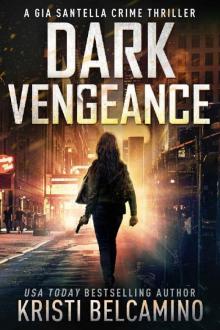 Dark Vengeance
Dark Vengeance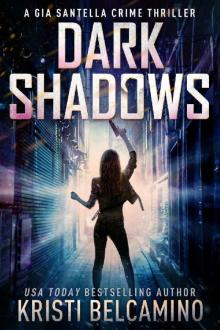 Dark Shadows (Gia Santella Crime Thrillers Book 11)
Dark Shadows (Gia Santella Crime Thrillers Book 11)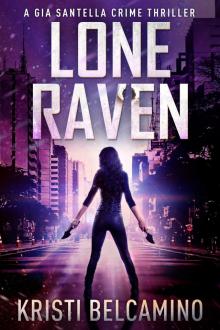 Lone Raven
Lone Raven![[Gia Santella 01.0] Gia in the City of the Dead Read online](http://i1.bookreadfree.com/i/03/16/gia_santella_01_0_gia_in_the_city_of_the_dead_preview.jpg) [Gia Santella 01.0] Gia in the City of the Dead
[Gia Santella 01.0] Gia in the City of the Dead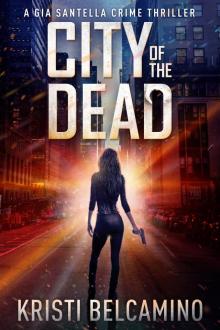 City of the Dead
City of the Dead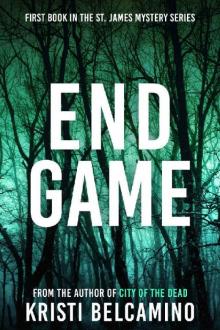 END GAME: A St. James Mystery (St. James Mysteries Book 1)
END GAME: A St. James Mystery (St. James Mysteries Book 1)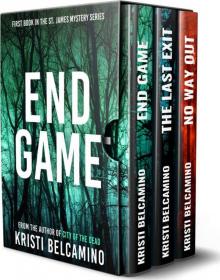 Tommy St James Mysteries Boxed Set
Tommy St James Mysteries Boxed Set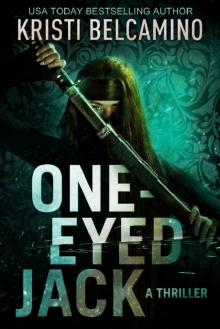 One-Eyed Jack
One-Eyed Jack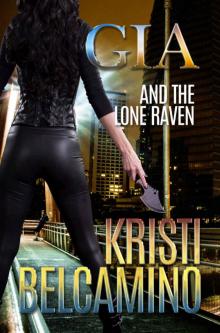 Gia and the Lone Raven
Gia and the Lone Raven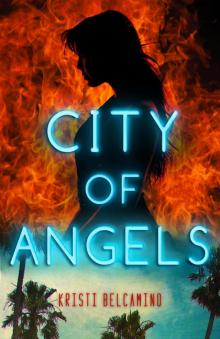 City of Angels
City of Angels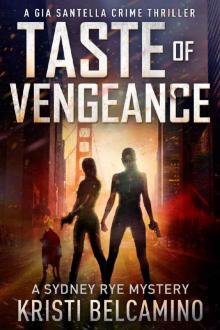 Taste of Vengeance
Taste of Vengeance Gia Santella Crime Thriller Boxed Set: Books 1-3 (Gia Santella Crime Thrillers)
Gia Santella Crime Thriller Boxed Set: Books 1-3 (Gia Santella Crime Thrillers) Death under the Stone Arch Bridge
Death under the Stone Arch Bridge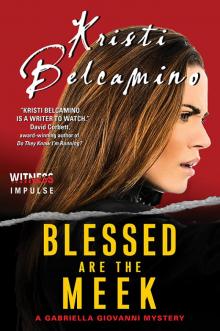 Blessed are the Meek
Blessed are the Meek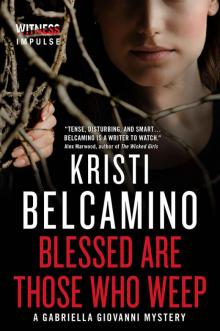 Blessed Are Those Who Weep
Blessed Are Those Who Weep Gia in the City of the Dead
Gia in the City of the Dead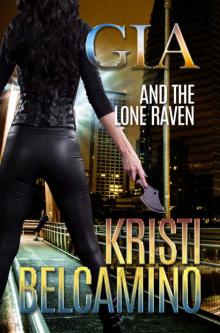 Gia and the Lone Raven (Gia Santella Crime Thriller - Novella Book 4)
Gia and the Lone Raven (Gia Santella Crime Thriller - Novella Book 4) Blessed are the Merciful
Blessed are the Merciful Blessed are the Peacemakers
Blessed are the Peacemakers Gia and the Forgotten Island (Gia Santella Crime Thriller Book 2)
Gia and the Forgotten Island (Gia Santella Crime Thriller Book 2)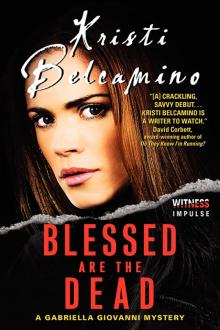 Blessed are the Dead
Blessed are the Dead Death on Sunset Hill
Death on Sunset Hill